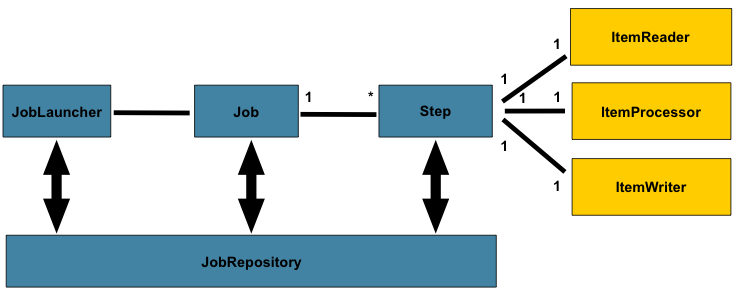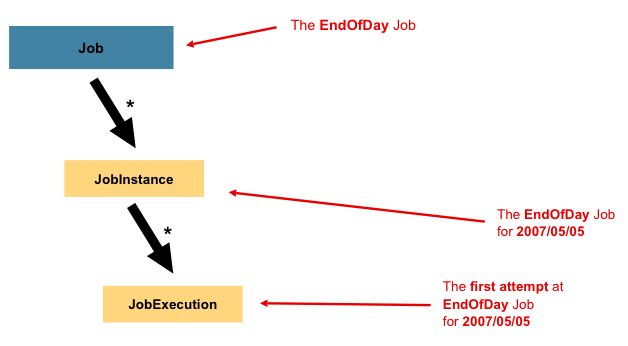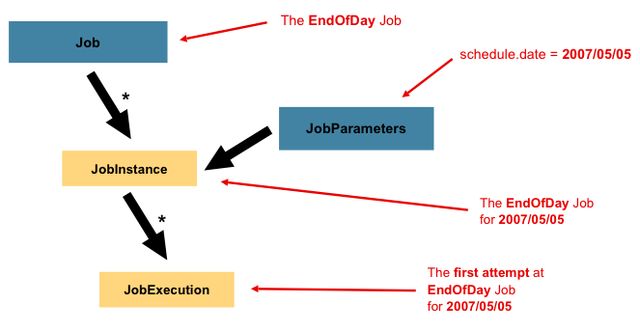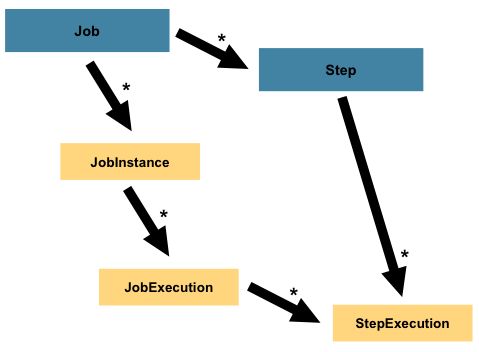Spring Batch入门_Job && Step
Spring Batch入门_Job && Step
Spring Batch的架构图
Job
A Job is an entity that encapsulates(封装) an entire batch process. As is common with other Spring projects, a Job will be wired together via an XML configuration file or Java based configuration. This configuration may be referred to as the "job configuration". However, Job is just the top of an overall hierarchy:
In Spring Batch, a Job is simply a container for Steps. It combines multiple steps that belong logically together in a flow and allows for configuration of properties global to all steps, such as restartability. The job configuration contains:
The simple name of the job
Definition and ordering of Steps
Whether or not the job is restartable
A default simple implementation of the Job interface is provided by Spring Batch in the form of the SimpleJob class which creates some standard functionality on top of Job, however the batch namespace abstracts away the need to instantiate it directly. Instead, the <job> tag can be used:
<job id="footballJob"> <step id="playerload" next="gameLoad"/> <step id="gameLoad" next="playerSummarization"/> <step id="playerSummarization"/> </job>
JobInstance
A JobInstance refers to the concept of a logical job run. Let's consider a batch job that should be run once at the end of the day, such as the 'EndOfDay' job from the diagram above. There is one 'EndOfDay' Job, but each individual run of the Job must be tracked separately. In the case of this job, there will be one logical JobInstance per day. For example, there will be a January 1st run, and a January 2nd run. If the January 1st run fails the first time and is run again the next day, it is still the January 1st run. (Usually this corresponds with the data it is processing as well, meaning the January 1st run processes data for January 1st, etc). Therefore, each JobInstance can have multiple executions (JobExecution is discussed in more detail below) and only one JobInstance corresponding to a particular Job and identifying JobParameters can be running at a given time.
JobParameters
Having discussed JobInstance and how it differs from Job, the natural question to ask is: "how is one JobInstance distinguished from another?" The answer is: JobParameters. JobParameters is a set of parameters used to start a batch job. They can be used for identification or even as reference data during the run:
JobExecution
A JobExecution refers to the technical concept of a single attempt to run a Job. An execution may end in failure or success, but the JobInstance corresponding to a given execution will not be considered complete unless the execution completes successfully. Using the EndOfDay Job described above as an example, consider a JobInstance for 01-01-2008 that failed the first time it was run. If it is run again with the same identifying job parameters as the first run (01-01-2008), a new JobExecution will be created. However, there will still be only one JobInstance.
Step
A Step is a domain object that encapsulates an independent(独立自主的人或事物), sequential phase of a batch job. Therefore, every Job is composed(组成) entirely of one or more steps. A Step contains all of the information necessary to define and control the actual batch processing. This is a necessarily vague description because the contents of any given Step are at the discretion of the developer writing a Job. A Step can be as simple or complex as the developer desires. A simple Step might load data from a file into the database, requiring little or no code. (depending upon the implementations used) A more complex Step may have complicated(使复杂) business rules that are applied as part of the processing. As with Job, a Step has an individual StepExecution that corresponds with a unique JobExecution:
StepExecution
A StepExecution represents a single attempt to execute a Step. A new StepExecution will be created each time a Step is run, similar to JobExecution. However, if a step fails to execute because the step before it fails, there will be no execution persisted for it. A StepExecution will only be created when its Step is actually started.
Step executions are represented by objects of the StepExecution class. Each execution contains a reference to its corresponding(对应的) step and JobExecution, and transaction related data such as commit and rollback count and start and end times. Additionally, each step execution will contain an ExecutionContext, which contains any data a developer needs persisted across batch runs, such as statistics or state information needed to restart.
=======END=======



